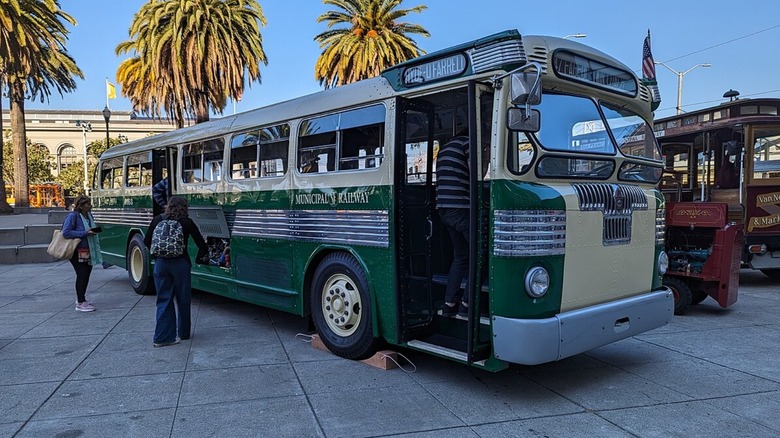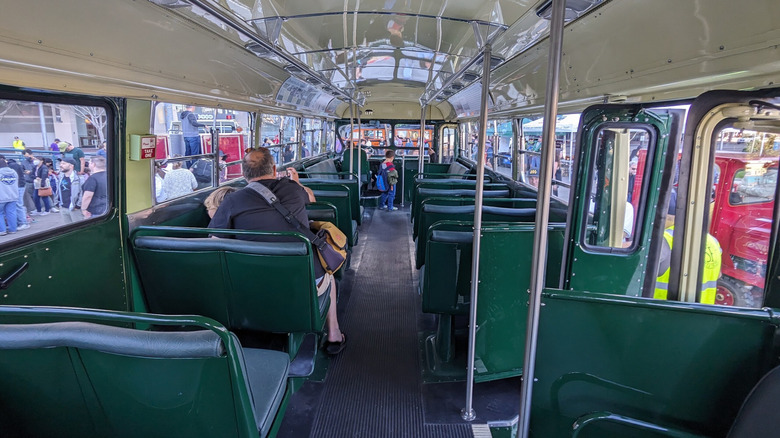San Francisco's 'Super Bus' Came Back After 72 Years, And Now It's Gone Again
It would be easy to conclude that buses aren't all unique. They're (if commuters are lucky) regularly operated, essential icons of public transportation. The fact is, though, the likes of an iconic bright red bus in London is an historic sighting. Aside from the U.K. capital, of course, buses are mainstays around the world. When it comes to transportation in San Francisco, the City by the Bay has a system that's a tourist attraction in its own right: Its remarkable cable car network. This system is instantly recognisable and truly unique. In fact, there's no other like it in the world. It's as much of an icon of the city as its legendary and bizarre twisted street.
At the same time, though, it's vital to note just how old this system is. It was first driven by the enterprising Andrew S. Hallidie in August of 1873, and so even the greatest of cable car lovers will have to admit that times have moved on considerably since then. Just as surely, the cable car system has evolved too, and there have even been attempts to upgrade to another system. There's one particularly notable example of this in the case of the Powell Street Line, where, after around 70 years of operation, the line was to be replaced by a fleet of buses.
This ultimately didn't pan out, but those buses became the stuff of San Francisco legend in their own right. For an annual celebration of the town's rich and fascinating transportation history, one of these so-called super buses was briefly returned to service, giving residents and local enthusiasts the chance to ride one of these classic models that could, potentially, have changed the face of public transport in San Francisco.
How super buses may have replaced the beloved cable cars
Changing long-established norms is never an easy task. With historic buildings and vehicles in particular, we don't like to see things go. When it was suggested back in 1947 that a specific cable car route may need to be altered, then, there was some controversy. This isn't to say, though, that nobody wanted to modernize the system over time.
In September 2025, the San Francisco Chronicle explained that Roger Lapham, mayor of the city in the 1940s, sought ways to modernize San Francisco's public transport system. The key to this, he thought, was a fleet of new buses for the Powell Street area. The newspaper quotes Market Street Railway president Rick Laubscher as declaring that the mayor's idea was to add advanced buses to the network, because "all the other buses in the fleet looked like loaves of bread." The resultant vehicles, of which 10 were built, were dubbed super buses, boasting nicely padded and roomy seats.
They served in this capacity only from 1947 to 1953, even though they were intended to be a more practical means of traversing the steep area. Just one, Fegeol Twin Coach Model 44-D Number 0163, survived and was given an extensive restoration. Thanks to this loving care, the model is still functional and resplendent in its bold color scheme. The irony, really, is that it's through this rarity that these super buses have become such a San Francisco legend.
The super bus returned for a very special occasion
These super buses weren't super enough to remain in continued use in the city, unlike the storied cable cars, which are one of the world's most iconic forms of transportation. Fegeol Twin Coach Model 44-D was a special guest, playing a big part of San Francisco's Muni Heritage Weekend 2025.
The annual event, from the San Francisco Municipal Transportation Agency, brings together the community for a range of activities and informational exhibits, with the highlight for vintage vehicle enthusiasts being the chance to take to the streets in some remarkable vehicles from the past. Among them at the 2025 event was 1896's car 578, better known as "Dinky." This little wonder is the country's oldest street car of its kind still in service, though that service is strictly limited.
Number 0163 was one such vehicle offering rides, but only for the two days of the event. The Muni Heritage Weekend has also hosted other notable buses that have made a mark on the city's transportation history. The above clip, from YouTube's Caliwalks, is from 2023's Muni Heritage Weekend. That ride is on a very similar-looking, but ultimately rather different bus. It's a "Mack Bus," a diesel-powered heavyweight that was leased to Muni by Mack in the mid-1950s. They would ultimately prove more numerous than the super buses, with Muni acquiring a total of 450 of them.

